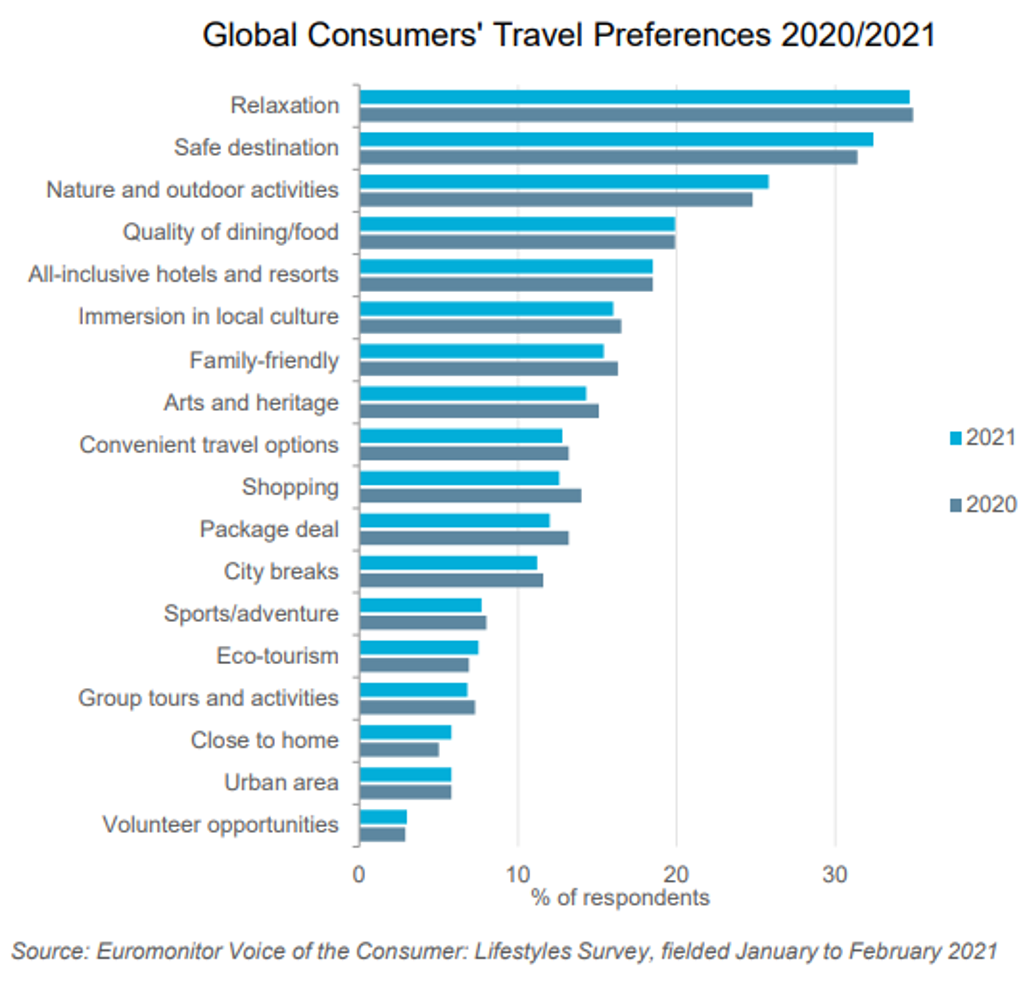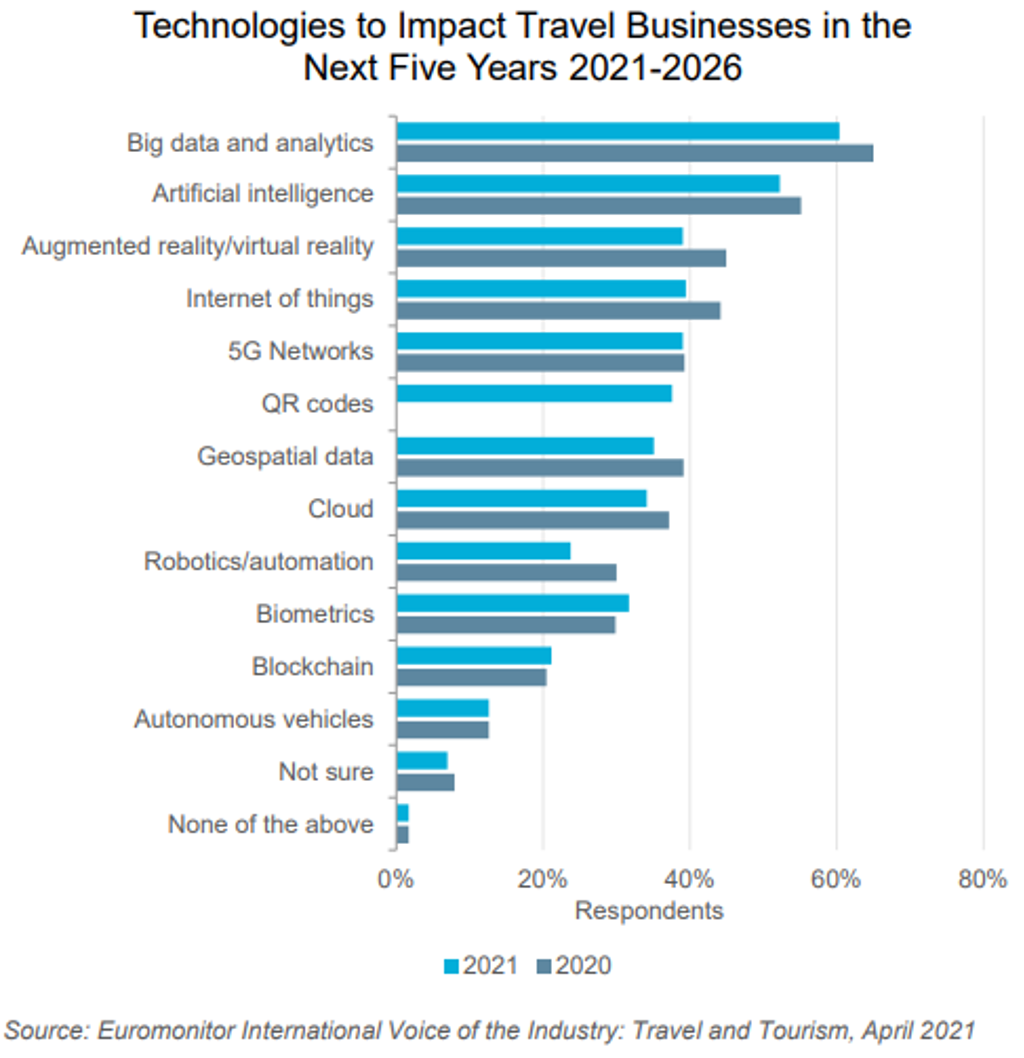The COVID-19 pandemic devastated the global travel industry. Euromonitor’s Travel Forecast Model indicates that global spending on travel declined by 75% in 2020. Many challenges remain in 2021, but vaccination campaigns have allowed travel to begin recovering in some markets.
As recovery starts, conversations surrounding sustainable travel are now resurfacing as one of the biggest issues for the industry in its recovery.
Shannon Stowell, CEO of the Adventure Travel Trade Association, believes that overtourism is a serious risk in travel’s recovery. “The places that were crowded before are going to be crowded again,” he said in an interview with Euromonitor International. Overtourism is a sustainability issue because it hurts destinations’ ability to preserve quality lifestyles for their residents and to protect the destination for future generations of tourists.
Popular tourist communities are eager to avoid a return to the pre-pandemic status quo. “If there’s any lesson we learned during this time, it’s for communities to voice the need for change.” said Stowell.

Before the pandemic, conversations about overtourism focused on cities. The new popularity of travel to rural destinations will push the industry to consider how to manage overtourism outside urban areas.
“Encouraging visitors to go to non-heavy use places is important,” said Stowell. “Pre-pandemic, [ATTA] took two groups to Peru. Previously, 100% of those people would go to Machu Pichu.
But working with the goal of limiting overtourism, neither of those itineraries went there.” Intentional dispersal of tourists away from the most popular sites is an important tool that destinations can use to protect themselves from overtourism.
Christina Beckman, Director of Research for ATTA and Tomorrow’s Air, believes technology will play an important role in dispersing tourists. “Apps like Hipcamp help people find a campground you wouldn’t ordinarily find.” These apps help both destinations and tourists.
Destinations can use them to reduce overcrowding at their most popular sites and increase spending at less popular ones. Tourists can use them to find unique travel experiences they wouldn’t get by only visiting a destination’s most crowded sites.

The travel industry recognises the important role technology will play over the coming five years. In Euromonitor’s 2021 Voice of the Industry: Travel survey, more than 50% of respondents indicated that big data and artificial intelligence will impact travel over the long term.
Additionally, more than 30% saw geospatial data as being impactful on the industry. For destinations that need to disperse tourists to less popular sites, live data that tracks crowding will be key to better manage the flow of visitors.
Beckman believes adventure tourism has an important role to play in managing the issue of overtourism. “Adventure travel is a great opportunity for economic development and conservation, but it’s not 100% great because some places won’t be ready for an influx of adventure visitors. It’s a change that’s happening fast that would normally happen gradually, and the way to manage this will be through open conversations and community engagement.”
Involving communities in discussions about sustainable tourism is key to ensuring the long-term health of destinations from both a community and tourism perspective. If destinations don’t actively manage levels of tourism, anti-tourism sentiment can flare up.
Flare-ups have occurred in destinations facing tourism, such as Barcelona and Venice which have both seen anti-tourism marches. The pandemic has added a health component to the weighing of tourism’s value, which has also contributed to anti-travel sentiment in markets such as Japan ahead of the Olympics.
Destinations including Iceland and Palau have begun to ask tourists to sign pledges upon arrival that ask them to be mindful while traveling. These pledges are pushing back against the idea that travelers are the primary stakeholders in tourism.
According to Stowell, “Travel is a privilege, not a right. I think we’ve become too casual about the sense of deserving vacations. [Following the pandemic], we have the opportunity now to start changing that attitude.”
The reopening of tourism across the world is a critical moment for sustainability in travel. Normalising mindfulness in travel will help prevent as much overtourism as was seen before the pandemic. The growing popularity of adventure travel among consumers can be an important tool in this process.
Adventure travel values respecting local communities and seeking out destinations that are off the beaten path. These values will be important for the industry to adopt to ensure a sustainable recovery from the pandemic.
